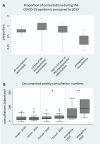Paediatric primary care in Germany during the early COVID-19 pandemic: the calm before the storm
- PMID: 34039654
- PMCID: PMC8159664
- DOI: 10.1136/fmch-2021-000919
Paediatric primary care in Germany during the early COVID-19 pandemic: the calm before the storm
Abstract
Objectives: Globally, the COVID-19 pandemic has a major impact on healthcare provision. The effects in primary care are understudied. This study aimed to explore changes in consultation numbers and patient management during the COVID-19 pandemic, and to identify challenges for patient care.
Design: Survey of paediatric primary care practices on consultation numbers and patient management changes, and semistructured interviews to identify challenges for patient care. Surveys and interviews were partially linked in an explanatory sequential design to identify patient groups perceived to be at higher risk for worse care during the pandemic.
Setting: In and around Düsseldorf, a densely populated area in Western Germany. The primary care facilities are spread over an area with approximately 2 million inhabitants.
Participants: Primary care in Germany is provided through practices run by self-employed specialist physicians that are contracted to offer services to patients under public health insurance which is compulsory to the majority of the population. The sample contained 44 paediatric primary care practices in the area, the response rate was 50%.
Results: Numbers of consultations for scheduled developmental examinations remained unchanged compared with the previous year while emergency visits were strongly reduced (mean 87.3 less/week in March-May 2020 compared with 2019, median reduction 55.0%). Children dependent on developmental therapy and with chronic health conditions were identified as patient groups receiving deteriorated care. High patient numbers, including of mildly symptomatic children presenting for health certificates, in combination with increased organisational demands and expected staff outages are priority concerns for the winter.
Conclusions: Primary care paediatricians offered stable service through the early pandemic but expected strained resources for the upcoming winter. Unambiguous guidance on which children should present to primary care and who should be tested would help to allocate resources appropriately, and this guidance needs to consider age group specific issues including high prevalence of respiratory symptoms, dependency on carers and high contact rates.
Keywords: COVID-19; child Health; community-acquired infections; primary health care.
© Author(s) (or their employer(s)) 2021. Re-use permitted under CC BY-NC. No commercial re-use. See rights and permissions. Published by BMJ.
Conflict of interest statement
Competing interests: DV-H and MK are members of the German paediatricians’ trade association bvkj (Berufsverband der Kinder-und Jugendärzte). The authors declare no other potential conflicts of interest.
Figures


Similar articles
-
The impact of the COVID-19 pandemic on child health and the provision of Care in Paediatric Emergency Departments: a qualitative study of frontline emergency care staff.BMC Health Serv Res. 2021 Mar 25;21(1):279. doi: 10.1186/s12913-021-06284-9. BMC Health Serv Res. 2021. PMID: 33766026 Free PMC article.
-
The effect of COVID-19 pandemic and lockdown on consultation numbers, consultation reasons and performed services in primary care: results of a longitudinal observational study.BMC Fam Pract. 2021 Jun 23;22(1):125. doi: 10.1186/s12875-021-01471-3. BMC Fam Pract. 2021. PMID: 34162343 Free PMC article.
-
Practice-Level Variation in Telemedicine Use in a Pediatric Primary Care Network During the COVID-19 Pandemic: Retrospective Analysis and Survey Study.J Med Internet Res. 2020 Dec 18;22(12):e24345. doi: 10.2196/24345. J Med Internet Res. 2020. PMID: 33290244 Free PMC article.
-
Human and novel coronavirus infections in children: a review.Paediatr Int Child Health. 2021 Feb;41(1):36-55. doi: 10.1080/20469047.2020.1781356. Epub 2020 Jun 25. Paediatr Int Child Health. 2021. PMID: 32584199 Review.
-
Multicountry review: developmental surveillance, assessment and care by outpatient paediatricians.Arch Dis Child. 2023 Mar;108(3):153-159. doi: 10.1136/archdischild-2021-322799. Epub 2022 Jun 28. Arch Dis Child. 2023. PMID: 35764409 Review.
Cited by
-
Pediatricians' experiences of managing outpatient care during the COVID-19 pandemic: A qualitative study in Germany.Front Pediatr. 2023 Apr 17;11:1127238. doi: 10.3389/fped.2023.1127238. eCollection 2023. Front Pediatr. 2023. PMID: 37138578 Free PMC article.
-
Infection control of COVID-19 in pediatric tertiary care hospitals: challenges and implications for future pandemics.BMC Pediatr. 2022 Apr 26;22(1):229. doi: 10.1186/s12887-022-03299-x. BMC Pediatr. 2022. PMID: 35473504 Free PMC article.
-
Experiences of Pediatric Pain Professionals Providing Care during the COVID-19 Pandemic: A Qualitative Study.Children (Basel). 2022 Feb 9;9(2):230. doi: 10.3390/children9020230. Children (Basel). 2022. PMID: 35204950 Free PMC article.
-
Impact of COVID-19 on essential healthcare services at the primary healthcare level in Armenia: a qualitative study.BMC Prim Care. 2024 Apr 24;25(1):131. doi: 10.1186/s12875-024-02377-6. BMC Prim Care. 2024. PMID: 38658818 Free PMC article.
References
MeSH terms
LinkOut - more resources
Full Text Sources
Other Literature Sources
Medical
